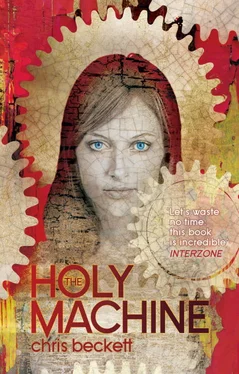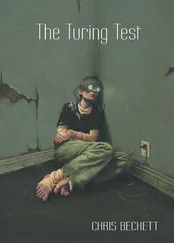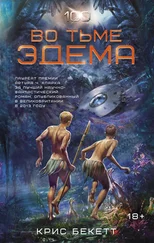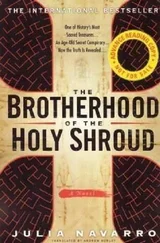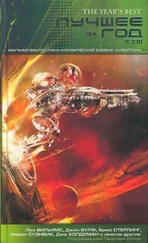They grinned and cackled at her as she turned to face them. Brandishing knives and pitchforks and burning branches, they edged slowly forward.
‘ Demon! Demon! Demon !’ they hissed.
Someone let loose with a shotgun. Pellets rattled against Lucy’s hard torso. A red flap of flesh fell away from her cheek. The crowd cheered.
‘ Demon! Demon! Demon !’
Lucy backed away. She had known hostility and violence in the ASPU house, but this was different. This was the hatred of people who knew she was alive. Her lips parted and from her mouth came out again that inhuman roar of noise. This gave the villagers a delicious frisson of horror:
‘ Demon! Demon! Demon !’
Lucy tripped on a stone and stumbled backwards. Seeing her fall, the crowd rushed forward shouting. But before they reached her, she managed to get back on her feet. With her strange speeded-up walk she raced to the shed, flung open the door and pulled it closed behind her.
Everyone hooted and laughed as they heard her piling things up inside to block the door.
‘Well, that shouldn’t be hard to force!’ said the shepherd Petros, stepping forward with Andreas and some other village men.
But the priest had his own ideas.
‘Wait!’ said this venerable old man, ‘No need to break down the door. We should burn the devil out!’
The villagers approved.
‘Burn! Burn! Burn!’ they chanted.
Three young boys were sent running back to the village to get paraffin. Others threw stones mockingly at the shed.
‘Watch out whore-demon, you’re going to burn, burn, burn! Let’s see what happens then to your pretty face.’
I made a forlorn attempt to intervene.
‘Have pity on her, please!’ What a thin, reedy little thing my voice sounded. ‘She’s done no harm. She can’t help what she is!’
I tried to push forward, but two young men grabbed hold of my arms and held me tightly, chuckling.
‘Eh, the demon has bewitched this City boy!’ called out a hard-faced young woman, in a voice as dry and abrasive as sandpaper. ‘She has bewitched him good and proper with her plastic tits and her pretty plastic eyes.’
The crowd laughed. More stones hurtled through the air.
Then the little boys came back up the path carrying a jerrycan between them, and the shepherds emptied it over the door of the shed. Someone else came forward with a burning torch. The dry wood burst into flames and the priest lifted his arms to the sky and pleaded with Father, Son and Holy Ghost to deliver them all from evil. The whole village joined in with a hymn.
Great orange tongues of oily flame reached up ten metres into the evening sky and illuminated the bare little quarry with apocalyptic light.
‘Burn! Burn! Burn!’ chanted the crowd when the hymn had finished, and the boys flung stones into the flames.
Eager to get a closer look, my excited captors released my arms and ran forward.
* * *
And then all that was left was a pile of smouldering ash with some scorched bits of metal farm machinery half-buried in it and, lying right in the middle, a vaguely human shape. Some of the young men made attempts to fish out the remains of the robot with pitchforks. There was a good deal of daredevilry and cheering and laughing, while the village girls played their part by giving terrified squeals and begging the boys to take care.
But the burnt robot was too far into the embers, and the heat too intense, for anyone to reach it.
‘We’ll get it in the morning,’ shouted the loudest of the boys, ‘We’ll nail it up high somewhere like they do in the north, so everyone will know that we kill our demons too.’
‘Let’s shove a pole up her and stick her outside the church,’ said another.
‘Ugh! That’s disgusting!’ said one of the girls.
‘Yes, Paulos, you are disgusting,’ said another boy.
‘You can’t talk. What about that donkey?’
‘What donkey, you lying swine?’
They were walking past me. I had expected them to turn on me now as the demon’s lover. I had expected to be knifed or hung or perhaps flung into the remains of the fire. But it didn’t happen. The villagers ignored me completely. They walked right past me as though I had become invisible. In small groups and large ones, the whole village made its way back down the donkey track, talking and laughing like revellers returning from a party.
I was left there on my own. Still unsteady from so much raki, I tottered to the edge of the glowing ash. Lucy’s body lay face down, its hands stretched outwards, devoid of any remnant of human flesh.
* * *
I remembered her room back at the ASPU house, the books that been placed there simply as props for the young college-girl image, yet each one of them slowly and painfully read by her in her efforts to understand the world in which she lived…
After some time, I made my way down the dark donkey track to the village. Although it was now the early hours of the morning, it seemed that the whole village, from aged crones to tiny children, was gathered either inside or outside of the single store. Bottles of wine and raki were being passed around. The policeman was drinking with the priest. A CD player was blasting out bouzouki music. Arm in arm the shepherds Petros and Andreas were dancing with the young men who’d tried to pull the shell of Lucy from out of the fire. There were many cheers and shouts of laughter.
‘Did you see when I shot her?’
‘If Markos wasn’t afraid of a little heat, he’d have held onto me and I’d have been able to fish the demon’s body out.’
‘We’d have knifed her there and then if she hadn’t dived out of the window.’
‘But did you hear that noise ?’
‘I tell you I hit her fair and square with that shot. That body of hers must have strong armour.’
No one paid the slightest attention to me. Except for a few children, no one so much as glanced in my direction.
I went over to my car. The bags that Lucy and I had left in the upstairs room had all been piled up neatly against the front wheel, and someone had scratched a symbol onto the paintwork on the door: a Greek cross, the emblem of the Greek Christian Army.
I climbed in and started up the engine, with an empty seat beside me. Then I drove very slowly away.
No one even looked round as I headed off into the darkness.
I drove all through the night, lurching and bumping along those crumbling roads, the car creaking and groaning, loose stones cracking against the doors and windscreen.
Trees, rocks, buildings, loomed momentarily into the headlights and vanished again.
Occasionally there was a goat or a rabbit.
Once I passed a priest, striding along alone in the middle of the night.
After I’d lost Lucy to the fire, I wandered for a long time with no purpose, without any sense of myself as an individual person who acted and made decisions in the world. Yet things still happened. A month or so afterwards, someone stole my car in the port of Patras. The loss of it troubled me, yet I had left it unlocked, as if part of me wanted to lose it. Something inside of me sought to rid myself of everything, to tear away the surface and expose the cowering thing inside, like Lucy tearing away her irrelevant flesh.
I went to the docks and bought a ticket for the first ship to sail. It was going north, to the Ionian islands, just across the water from where my journey began.
I arrived late at night in Corfu. I needed somewhere to rest and I found a sailors’ hostel near the port, where I’d have to share a room.
My roommate didn’t get in until two in the morning. He was an elderly Venetian seaman. He had just been paid and had been out in the Old Town drinking. He had finished off by visiting a prostitute. Now he was feeling disgusted with himself.
Читать дальше
